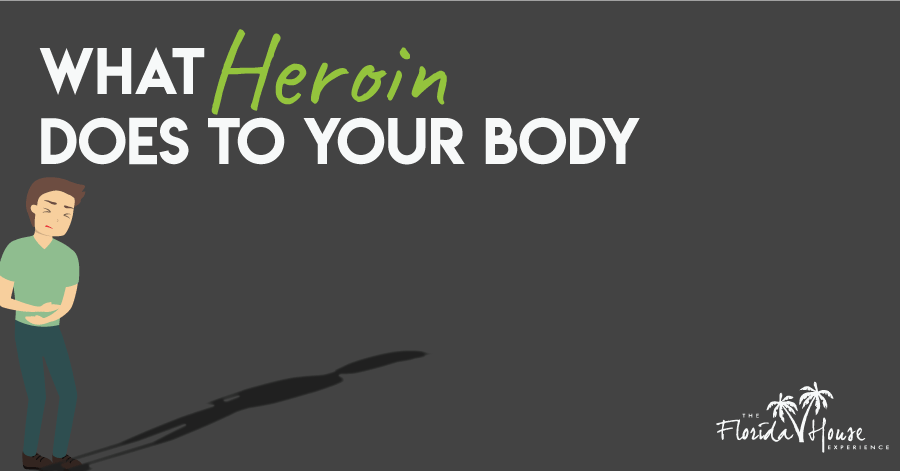
Heroin addiction has become a serious issue that is affecting the entire country. As more and more people find themselves addicted to opioids, heroin continues to grow in popularity due to its easy access and cheap price. Heroin not only has the power to take your life but also has risks and negative effects with what it does to your body and brain chemistry. As time passes it is critical to understand how heroin addiction is affecting you.
How Does Heroin Affect the Body Overall?
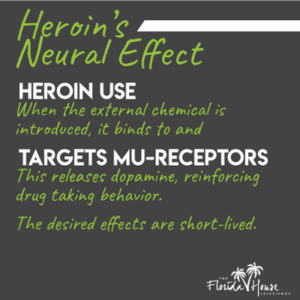 When heroin is first ingested, it binds to and activates specific receptors in the brain called mu-opioid receptors (MORs). Naturally, these receptors regulate pain, hormone release, and feelings of well being through naturally occurring chemicals called neurotransmitters that bind to these. When MORs are activated in the reward center of the brain, they stimulate the release of the neurotransmitter dopamine, causing a reinforcement of drug-taking behavior. The consequences of activating opioid receptors with externally administered opioids such as heroin (versus naturally occurring chemicals within our bodies) depend on a variety of factors. How much is used, wherein the brain or body it binds, how strongly it binds and for how long, how quickly it gets there, and what happens afterward all play a factor in the reaction our body has to the substance. Not only does heroin have short-term effects on your brain and body, but they also have potentially deadly long-term effects too.
When heroin is first ingested, it binds to and activates specific receptors in the brain called mu-opioid receptors (MORs). Naturally, these receptors regulate pain, hormone release, and feelings of well being through naturally occurring chemicals called neurotransmitters that bind to these. When MORs are activated in the reward center of the brain, they stimulate the release of the neurotransmitter dopamine, causing a reinforcement of drug-taking behavior. The consequences of activating opioid receptors with externally administered opioids such as heroin (versus naturally occurring chemicals within our bodies) depend on a variety of factors. How much is used, wherein the brain or body it binds, how strongly it binds and for how long, how quickly it gets there, and what happens afterward all play a factor in the reaction our body has to the substance. Not only does heroin have short-term effects on your brain and body, but they also have potentially deadly long-term effects too.
Short-Term Effects of Heroin Use
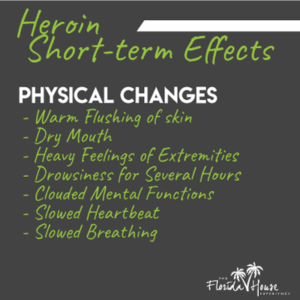 When heroin first enters the brain, it is converted to morphine and binds rapidly to opioid receptors. People who use heroin will feel a surge of pleasurable sensation, known as a “rush” or a “high”. The intensity of that rush is dependant on how much of the drug is taken and how rapidly the drug enters the brain and binds to the opioid receptors. Typically, the rush is usually accompanied by a warm flushing of the skin, dry mouth, and a heavy feeling in the extremities. Nausea, vomiting, and severe itching are also known to occur. After the initial effects have subsided, users usually will be drowsy for several hours, their mental function is clouded, their heart function slows, and breathing is also severely slowed. In extreme cases, the slowed breathing can be enough to cause a coma and permanent brain damage.
When heroin first enters the brain, it is converted to morphine and binds rapidly to opioid receptors. People who use heroin will feel a surge of pleasurable sensation, known as a “rush” or a “high”. The intensity of that rush is dependant on how much of the drug is taken and how rapidly the drug enters the brain and binds to the opioid receptors. Typically, the rush is usually accompanied by a warm flushing of the skin, dry mouth, and a heavy feeling in the extremities. Nausea, vomiting, and severe itching are also known to occur. After the initial effects have subsided, users usually will be drowsy for several hours, their mental function is clouded, their heart function slows, and breathing is also severely slowed. In extreme cases, the slowed breathing can be enough to cause a coma and permanent brain damage.
Long Term Effects of Heroin Use
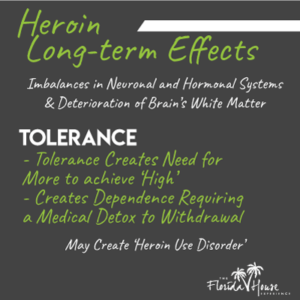 The more someone uses heroin, the more changes that will occur to the chemical and physiological makeup of the brain. This creates long-term imbalances in neuronal and hormonal systems that are not easily reversed. Studies have shown that prolonged heroin use can cause some deterioration of the brain’s white matter. That can affect decision-making abilities, the ability to regulate behavior, and responses to stressful situations. Heroin also creates a sense of tolerance and physical dependence. Tolerance occurs when more and more of the drug is required to achieve the same effects. With physical dependence, the body adapts to the presence of the drug, and withdrawal symptoms occur if use is reduced abruptly.
The more someone uses heroin, the more changes that will occur to the chemical and physiological makeup of the brain. This creates long-term imbalances in neuronal and hormonal systems that are not easily reversed. Studies have shown that prolonged heroin use can cause some deterioration of the brain’s white matter. That can affect decision-making abilities, the ability to regulate behavior, and responses to stressful situations. Heroin also creates a sense of tolerance and physical dependence. Tolerance occurs when more and more of the drug is required to achieve the same effects. With physical dependence, the body adapts to the presence of the drug, and withdrawal symptoms occur if use is reduced abruptly.
When not monitored and done correctly, withdrawal can be incredibly dangerous. Withdrawal may occur within a few hours after the last time the drug is taken. Symptoms of withdrawal include restlessness, muscle and bone pain, insomnia, diarrhea, vomiting, cold flashes with goose bumps, and leg movements. Major withdrawal symptoms peak between 24 and 48 hours after the last dose of heroin and can last as long as a week. In some extreme cases though, some people have shown withdrawal symptoms for many months after stopping.
In addition to the effects and withdrawal symptoms associated with heroin use, prolonged use of the drug can also result in something called heroin use disorder. Heroin use disorder is a chronic relapsing disease that goes beyond physical dependence and is characterized by uncontrollable drug-seeking, no matter the consequences. Heroin is extremely addictive no matter how it is administered. Once a person has heroin use disorder, seeking and using the drug becomes a top priority in life.
Medical Complications Caused By Heroin
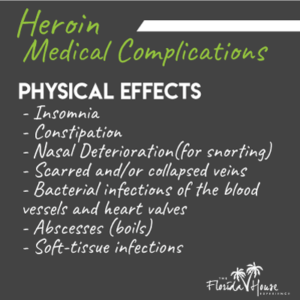 In addition to the symptoms listed above, heroin use can also result in potentially life-threatening medical issues and complications. In fact, chronic heroin users typically experience a variety of medical complications, including insomnia and constipation. Lung complications may result from the poor health of the user as well as from heroin’s effect of depressing respiration. Many also experience mental disorders, such as depression and antisocial personality disorder. Men can often experience sexual dysfunction and women’s menstrual cycles often become irregular. There are also specific issues that come with different forms of administration. For example, people who repeatedly snort heroin can damage the mucosal tissues in their noses as well as perforate the nasal septum.
In addition to the symptoms listed above, heroin use can also result in potentially life-threatening medical issues and complications. In fact, chronic heroin users typically experience a variety of medical complications, including insomnia and constipation. Lung complications may result from the poor health of the user as well as from heroin’s effect of depressing respiration. Many also experience mental disorders, such as depression and antisocial personality disorder. Men can often experience sexual dysfunction and women’s menstrual cycles often become irregular. There are also specific issues that come with different forms of administration. For example, people who repeatedly snort heroin can damage the mucosal tissues in their noses as well as perforate the nasal septum.
Heroin use can wreak havoc on one’s body and the way it functions. Medical consequences of chronic injection use include:
- Scarred and/or collapsed veins
- Bacterial infections of the blood vessels and heart valves
- Abscesses (boils)
- Soft-tissue infections.
There is also the issue of what is mixed with the heroin. It is very rare that you will be able to find pure heroin. Most heroin that can be purchased on the street had other substances that are added to it. Many of these additives include substances that do not readily dissolve. This can result in the clogging of the blood vessels that lead to the lungs, liver, kidneys, or brain, which can cause infection or even death of small patches of cells in vital organs. Immune reactions to these or other contaminants can cause arthritis or other rheumatologic problems.
Then there are the medical consequences associated with sharing needles and other equipment. Doing so can lead to infections with hepatitis B and C, HIV, and a host of other blood-borne viruses, which drug users can then pass on to their sexual partners and children.
Overcoming Heroin Addiction
Without heroin addiction treatment, you will continue to suffer on a path you may not have the opportunity to recover from. The damage on your body and brain will only worsen with time and no matter how high your tolerance is for heroin, the chance of a fatal overdose is always there as well. By going through heroin addiction treatment in Alaska, you will be provided the tools and coping mechanisms necessary for you to recreate what your life looks like. Having an understanding of your addiction will allow you to move forward from it.
Are You In Need of Heroin Addiction Treatment?
At FHE Health, our trained professionals will be able to help you or your loved one find your way to a life of recovery. Heroin is a travesty that takes away too many lives each year. Do not face this alone, contact us today at and choose life again.






